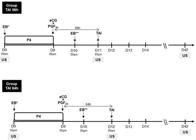ABSTRACT:
The aim of this study was to evaluate different times for timed artificial insemination (TAI) in buffalo submitted to a P4/E2/eCG-based protocol. In this study, 204 buffaloes were distributed into one of two groups (TAI56, n=103 and TAI64, n=101). At a random stage of the oestrous cycle (Day 0 = D0), in the morning (TAI56, a.m.) or afternoon (TAI64, p.m.), buffaloes received an intravaginal progesterone device (P4; 1.0 g) plus EB (2.0 mg i.m.). On D9 a.m. (TAI56) or p.m. (TAI64), the P4 was removed and buffaloes received PGF2a (0.53 mg i.m. sodium cloprostenol) and eCG (400 IU i.m.). On D10 a.m. (TAI56) or p.m. (TAI64), 24 h after P4 removal, buffaloes were treated with EB (1.0 mg i.m.). Buffaloes from TAI56 and TAI64 were inseminated 56 and 64 h after P4 removal (D11, p.m. and D12, a.m., respectively). Ultrasound examinations were performed on D0 to ascertain ovarian follicular status, at TAI to measure the diameter of the dominant follicle (DF) and D42 for pregnancy diagnosis. The statistical analysis was performed using the GLIMMIX procedure of SAS®. There was no difference between TAI56 and TAI64 for the diameter of the DF at TAI and the pregnancy per TAI. It was concluded that TAI 56 or 64 h after P4 removal did not affect fertility in buffaloes submitted to the induction of ovulation with EB. The present research supports that is possible to perform TAI at any time throughout the day in buffalo synchronized during the non-breeding season.
Key words:
anoestrous; artificial insemination; oestradiol benzoate; follicle; induction of ovulation

 Thumbnail
Thumbnail
 Thumbnail
Thumbnail
 Thumbnail
Thumbnail


